Arthur E. Shears's Blog, page 3
February 24, 2025
GAZA Reflections
At the beginning of this post, let me state that the Hamas attack on Israel on October 7 was a disgusting act of violence and murder. Let me also say that the Israeli reaction was…? Sorry I can’t find the right words. Really bad, does not suffice.
Gaza was a different place when I worked there as a consultant with UNRWA from 2005 to 2007. The border crossings were mostly still open even though the one at Rafah was on again-off again. UNRWA was expanding its efforts in technical and vocational education with funds from Gulf countries, the European Union, and the United States. My assignment was to advise on best ways to integrate ICT into UNRWA-run schools and contribute to expansion and upgrading of the Gaza Training Center. Later, I was asked to coordinate the project constructing the Khan Younis Training Center.
 Khan Younis Training Center building under construction in 2005. Notice on the sign that one of the funding countries was the United States.
Khan Younis Training Center building under construction in 2005. Notice on the sign that one of the funding countries was the United States. During my stay in Gaza, the administration of the territory passed from Fatah to Hamas with considerable fighting between them before Fatah was pushed out. (Fatah is still in charge of the West Bank although it seems Israeli settlers and some far-right politicians are continuing to make life difficult for Palestinians there.) Fighting in Gaza got so bad then that virtually all international UNRWA staff were moved out temporarily. In my case that was to the UNRWA offices in Amman, Jordan. In the event, I did not make it back to Gaza before the KYTC construction was complete, and friends had to send me photos of the near completed complex.
 Part of Khan Younis Training Center complex nearing completion.
Part of Khan Younis Training Center complex nearing completion. Recent reports on the KYTC suggest it was damaged but instructors and students are still teaching and learning, mostly by e-learning; a method they learned during COVID. (Recall that recently, the KYTC was also home to thousands of refugees displaced from the North.) How brave and dedicated are the staff and students there. Sadly, the Gaza Training Center which was part of the large UNRWA complex in Gaza City has been severely damaged. The GTC is where my office was located. I have no pictures of its devastation.
Israel recently declared UNRWA a terrorist organization (which is blatantly untrue), shut the UNRWA office in Jerusalem, and forced the closing of the UNRWA Training Center there. Israel has pledged not to work at all with UNRWA and seeks to replace its UN mandated role by other unspecified agencies. The UN Secretary-General rejects the Israeli Government’s position and its activities against UNRWA.
Refresher on UNRWA
The agency produced interesting infographics summarising its reach, activities, and funding.

Many of you may be surprised that there are UNRWA refugee camps in Syria, Jordan and Lebanon. This infographic shows pledges worth $1.12 bn in 2022. At that time, the biggest donor was the US.
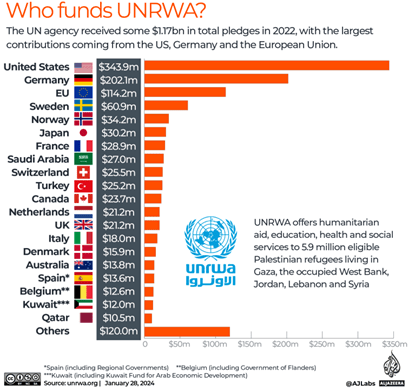
Al Jazeera had an informative post about a year ago just after some countries including the US froze their contributions after accusations that a dozen UNRWA staff had engaged in the October 7 attack on Israel. See it below.
Which countries have cut funding to UNRWA, and why? | News | Al Jazeera
Countries such as Canada and the UK re-established funding later, after UNRWA took follow-up action that included the firing of the accused staff members. Recently, the Trump Administration announced they were terminating all funding to UNRWA permanently. The agency is now in a dire funding conundrum with extra demands for its services, and damage to or complete destruction of its schools, health centers and offices in Gaza. With the funding crisis and Israel ignoring its international obligations towards UNRWA, it is not clear if the agency will be able to survive.
What Now?
What happens now is still up in the air. President Trump’s idea for the US to take over Gaza turned out to be a lead balloon although some far-right Jewish thinkers believe moving the Palestinians out of Gaza is both viable and morally acceptable.
Resettling Gaza: Is it the right thing to do and can it work? Yes it can. :: Gatestone Institute
The Biden administration in the US was pushing for a Palestinian state. That didn’t happen in good measure because as US Secretary of State Anthony Blinken said the Israelis continue to under-cut efforts to create one. Last year the Government of South Africa brought a genocide case against Israel to the International Court of Justice for its conduct during the war with Hamas. The final ruling is still pending.
What is South Africa’s genocide case against Israel at the ICJ?
In November 2024, the International Criminal Court issued arrest warrants against Prime Minister Netanyahu and former Defence Minister Gallant as well as senior Hamas leaders. Read more about this story on Wikipedia.
International Criminal Court arrest warrants for Israeli leaders – Wikipedia
What is sure is that the Palestinians in Gaza are going to need help in everything from housing to water and electricity supply. Students (and instructors) from UNRWA’s training centers could and should play a part in the reconstruction efforts. That is, if the training centers can be repaired and if UNRWA continues to exist.
In my view, UNRWA is the most effective agency to support the Palestinians in Gaza and elsewhere. It will eventually not be needed when a two-state solution is agreed and established to provide security and prosperity to both sides. I see no role for Hamas unless it disavows its terror policies.
From the past
Below are some pictures from Gaza during my stint there. Pleasant memories.
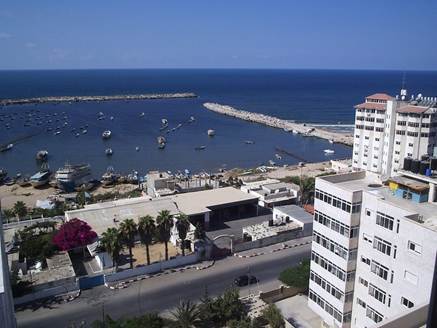 Gaza city harbour. My apartment was nearby.
Gaza city harbour. My apartment was nearby. 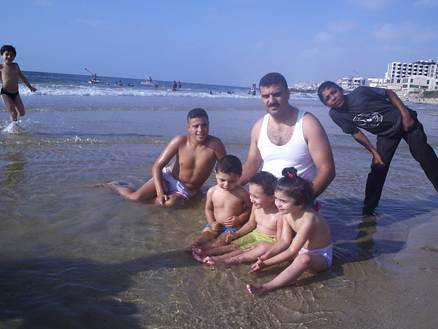 Family enjoying the beach in Gaza city
Family enjoying the beach in Gaza city  Female trainees in electrical workshop at the Gaza Training Center
Female trainees in electrical workshop at the Gaza Training Center 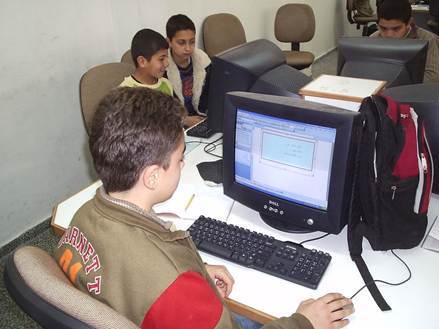 Students enjoying the new computer lab at an UNRWA school in Gaza
Students enjoying the new computer lab at an UNRWA school in Gaza When will we be able to see these scenes again?
February 21, 2025
Trump set to fire entire USA hockey team after loss to Canada

Reports suggest since team members are all recent hires (just for the 4 Nations Cup), they can be fired immediately. Meanwhile, it’s rumored the FBI are set to investigate whether the Zamboni operator was a DEI hire who sabotaged the ice in favor of the Canadians.
No, just kidding.
Well done Team Canada for the tournament win, and congratulations also to the US, Finland and Sweden for reminding us how exciting ice hockey can be.
February 7, 2025
Up to 150 Fellowships Available
 Rotary Peace Centers
Rotary Peace CentersWe are looking for the next cohort of dedicated peace and development leaders to become Rotary Peace Fellows! The application for fully funded 2026 Rotary Peace Fellowships is now available for our master’s degree and professional development certificate programs. Candidates can learn more and start an application: https://on.rotary.org/3J6sYLP
The application for fully funded 2026 Rotary Peace Fellowships is now available for our master’s degree and professional development certificate programs. Candidates can learn more and start an application: https://on.rotary.org/3J6sYLP Apply by 15 May!
Apply by 15 May!
Each year, Rotary awards up to 130 fully funded fellowships for dedicated leaders from around the world to study at one of our peace centers.
My cousin Howard is an ardent Rotary Club supporter (and a VON supporter too). He shared the above notice.
Thanks Howard, and well done Rotary.
February 4, 2025
USAID OBITUARY
Well, sorry to say, but CNN was correct yesterday in its reporting of the demise of USAID as an entity. I defer to my friends at ICTworks who posted the below notice. You can read the full story here:
An Obituary for USAID: an Icon of Global Development – ICTworks

We hope that eventually it will re-emerge under the US State Department in some form. Time will tell.
Keep well and doing good.
February 3, 2025
International Development Week – May 3-7, 2025
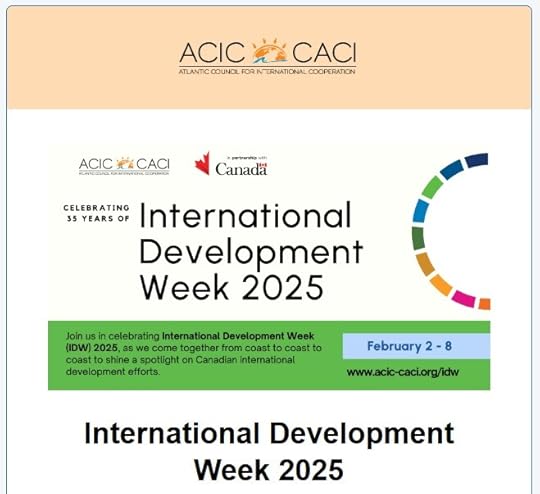
Dear BLOG followers and friends. I hope you recall that this week is International Development Week. Hurrah! What are you doing to promote this week?
Although with the Trump administration’s freeze on US AID, there may indeed be more to worry about than to celebrate. (Please tell me what I saw on CNN today about Elon Musk recommending USAID be scrapped to save money was just an illusion.)
Being more positive, I would like to share what the Atlantic Council for International Cooperation (ACIC) has planned for the week – everything from cooking demonstrations to trivia games.
Celebrate International Development Week with ACIC!
For those interested in obtaining an international internship and who reside in the Atlantic provinces, you can find out more at their Zoom meeting tomorrow. (TUESDAY, May 4, 2:00 – 3:30 pm, AST. Go to their newsletter, and click on the LEARN More button.)

Good luck everybody, including our friends in the USA, who are celebrating this International Development Week 2025.
KEEP WELL AND DOING GOOD.
January 29, 2025
A MUST READ – US AID Funding Freeze

One of my recent posts referenced an excellent online publication, ICTWorks. As the name implies it mostly focuses on the why and how of using ICT for development. But after the shocking news of President Trump freezing all US AID funding it has a well written, informative (and worryingly accurate) report on the potential effects this freeze will have on international development activity. As a former consultant with several UN agencies, I am dismayed at the potential revenue loss various UN agencies will face, not to mention the massive effect on numerous non-governmental organizations.
I am also disappointed at my lack of previous knowledge on the details of aid from the USA. The US has been a fantastic partner for international development in the past. We can only hope this freeze will be temporary and other countries will be able to take up the slack in the meantime. You can find the article at the website below.
US Aid Frozen: A Real Humanitarian Crisis and Lives will be Lost
Other News – Catalyste+
I have submitted an application to become a volunteer with Catalyste+. So far, I have had my resume reviewed, participated in an interview and sent a request to two former colleagues for references. My next post will provide a further update on the process for those who might be interested.
Keep well and doing good.
January 8, 2025
Taking a Critical Look at USAID Approach to Development Funding

PBS News Hour : January 7, 2025 – PBS News Hour full episode | Cascade PBS
For those interested in how the USAID funds international development, a current segment in PBS News Hour will be of interest. I rarely watch PBS Newshour but last evening I did have time and found this informative story about USAID. Apparently, the agency does most of its work through big US companies that seem to focus more on inputs and activities rather than results. One section of the story gave examples of an alternative approach where funds were provided directly to local partners who provided much better results.
Sidebar: The assignment I had some years ago with one of these big US firms did indeed engage with local entities including a local training center, private sector entities, and schools. There were positive results. So not all USAID projects are alike.
In Canada, I think we do better with implementing agencies like CUSO providing volunteers to strengthen local NGOs, many of which are supporting projects on gender equality and improved livelihoods for women. (Don’t forget to keep monitoring CUSO International’s website for current employment opportunities)
Similarly, CATALYSTE+ (formerly CESO), is providing senior professionals the opportunity to give back by offering their advice on short missions to host organizations that actually help develop the assignment’s terms of reference. I just submitted an application to CATALYSTE+ and will describe that process and its result in an upcoming post.
Meanwhile, I look forward to seeing the next two episodes of the 3 part USAID story on the PBS Newshour…
December 17, 2024
ICT for Development
If you’re interested in ICT for development (ICT4D), I strongly recommend the organization – ICTworks – that produces an informative newsletter for its 25,000+ readers. The newsletter is free and comes out every few days. A couple of its recent editions had these topics:
53 Responsible AI and Ethical Data Use GuidesApply Now: $3 Million Internet Freedom Grants from US State DepartmentYou can visit the ICTworks newsletter to find out more about the organization, its functions and how to get its newsletter from this website.

ICTworks – Expertise in sustainable ICT4D for the developing world
I trust you find the information they share to be of value. I am going to try one of their recent suggestions, to use ChatGBT to draft expressions of interest.
November 18, 2024
Ghana, Oil and Education

Introduction
This post is the third in the follow-up theme of how oil and gas discoveries affected three countries referenced in my book “Overseas Adventures – From Afghanistan to Zambia and Points In-Between.” The first two posts were about Timor-Leste and Guyana respectively. Recall from my book that I was in Ghana in the mid-1970s as a Field Staff Officer with the Canadian volunteer agency CUSO. Although not mentioned in the book, I also had the pleasure of working in Ghana with the FAO in the early 1990’s on an agroforestry extension project as a development communication advisor.
Offshore oil
Oil was discovered offshore in 2007 and production started in 2010. Ghana is considered the 8th largest producer in Africa but its daily output in 2022 was only 174,000 barrels per day considerably less than juggernauts Nigeria and Angola. Still, Ghana earned some 6.5 billion USD in the first 10 years of production, and in 2022, another USD 1 billion. New discoveries have raised future output estimates to some 400,000 bpd.
You may find this video clip on the oil industry in Ghana informative. “How Ghana only earned $8 billion in oil revenue?” There are some nice visuals of Ghana too.
Government response
The Government passed legislation in 2011 entitled the Petroleum Revenue Management Act to establish proper use of oil revenues. The Ghana Heritage Fund and Ghana Infrastructure Investment Fund were also established. Apart from transfers to these entities the Government directly spent considerable amounts on infrastructure particularly roads, alternate energy sources, health and education. However, there was controversy when required transfers to the GIIF were not made on time and the Government took money from the GHF early to deal with the effects of COVID and to initiate the free Secondary High School Initiative.
Although the Free Senior High School (SHS) policy in Ghana increased secondary school enrolment by 13.5% from 2017 to 2018, it was criticized for overcrowding classrooms and dormitories. Critics also raised concerns about its financial sustainability and the impact on education quality. Despite the controversy, public opinion remains largely favorable, and a 2024 study confirmed that FREESHS has a positive impact on girls’ educational attainment amongst other benefits.
Free secondary education policy and education attainment – ScienceDirect,
Technical and Vocational Education (TVET)
In my view, apart from secondary general education, the TVET sector also needs more of Ghana’s oil revenue. The country’s Education Strategic Plan notes that “Currently, technical and vocational education is limited in scope and does not cover the diverse needs of learners or of Ghana’s economy. The relevant institutions are also ill-equipped to provide an adequate education, and all of these factors contribute to the poor perception of TVET. The TVET sub-sector also receives less than 3% of the overall education expenditure.” (p8)
ghana-education-strategic-plan-2018-2030.pdf
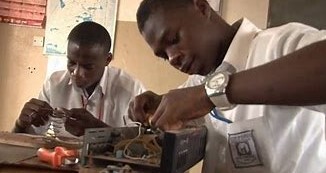
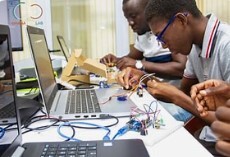
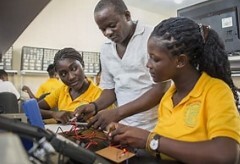
I am gratified to see that Government plans do suggest a serious effort to enlarge and enhance this sector as indicated below. My hope is that the allocated budget for TVET gradually rises to five or even eight percent of total education budget.
“The ESP response to existing challenges is therefore to implement the new TVET policy and ensure improved coordination of provision, increase access, and improve relevance under the umbrella of the realignment of the TVET sub-sector, which is a key pillar of the reform agenda. All TVET programmes and institutions will be brought under the Ministry of Education (MOE), to improve coordination, coherence, monitoring, and quality of the offer provided. These institutions, along with their budgets, will fall under the oversight of the MOE and improving data collection and collation from TVET institutions will be an important part of mapping the success of the realignment. The new TVET curriculum will be developed in close cooperation with the industrial, commercial, and business sectors. In line with curriculum reform in other sub-sectors, the new TVET curriculum will be competency based. The competencies will be based on identified skills’ gaps and will be decided on in collaboration with the private sector.” (page 38)
Conclusion
Ghana’s oil wealth has a significant positive impact on areas such as education. For example, this month (November, 2024), the President of Ghana said the free secondary school scheme has benefited some 5.7 million students since its inception.
And, as noted in the previous section there are significant plans to develop the TVET sector, and other parts of education including primary, secondary, higher and continuing education. There have also been investments in infrastructure especially roads and in health provision.
That said, there are still challenges with oil revenue distribution and unintended consequences such as perceived threats to democracy.
A 2023 study entitled “An empirical review of petroleum revenue management and distribution after a decade of oil production and export in Ghana” concluded:
“that petroleum revenue collection and allocation has largely been done with reference to the PRMA. However, ministerial discretion and lack of a clear-cut definition of the priority areas are sources of abuse to oil revenue management. The study, thus, calls for reforms in the management and use of oil revenues to help ensure long-run benefit and sustainability.”
In short, there is still work for the government and other stakeholders in Ghana to do before deciding whether oil has been a blessing or a curse.
November 5, 2024
Guyana – 2024 – Enjoying an Oil Boom

This is the second of my posts about oil in three countries where I worked previously and what is happening now after oil was discovered. The first country covered was Timor Leste, the next post will be on Ghana.
My last assignment in Guyana was as a distance education consultant on a Canadian funded teacher training project. That enjoyable work was spread over four years ending in 2002 and is a chapter in my book “Overseas Adventures – from Afghanistan to Zambia and Points in Between.” Back then Guyana’s oil had not yet been discovered. That changed in 2015.
Exxon Mobil found oil off the country’s coast in what is called the Stabroek Block named after Georgetown’s iconic market and bell tower. Other discoveries followed and Guyana has estimated oil reserves of 11-billion barrels making it comparable to countries such as Norway. Guyana currently boasts the fastest-growing economy in the world.
Spending its new oil wealth wisely
The Government of Guyana established a Natural Resource Fund in 2019 much as Norway did decades earlier from its oil and gas revenue windfall. The Government started spending from the fund in 2022 and initially focused on capital projects including roads, bridges, schools, hospitals and energy connectivity and expansion. According to an article in the E-journal, OilNOW,
“The Guyana government is on course to withdraw US$2.3 billion in oil revenue from its Natural Resource Fund (NRF) in 2025 to support that year’s budget. This would represent a 46% increase from the almost US$1.6 billion amount approved for use this year [2024].
Vice President Bharrat Jagdeo frequently stresses a preference for spending ‘for the future’, rather than on steep salary hikes. However, the government has promised that compound increases to salaries over a few more years will place key public servants like teachers and nurses on par with their counterparts in the developed world.”
Guyana on course to boost oil money spending by almost half in 2025 | OilNOW
This is encouraging news since migration of professionals from Guyana for many years previous was a serious problem. Indeed, I personally know of at least one lecturer at the Cyril Potter College of Education who retired early and took up a manufacturing job in Canada due to the relatively poor salaries in his home country. There were similar staff loss issues at the University of Guyana too.
Spreading the wealth around
An October 2024 article in the Jamaica Observer noted that the Government of Guyana is going to give USD 100,000 to everyone of its citizens 18 years and older.
$100,000 cash to every citizen above 18: Guyana spreading its oil wealth – Jamaica Observer
“In October 2024, the Mohamed Irfaan Ali Government in Guyana ramped up its already spectacular programme of spreading its new-found oil wealth by announcing it would provide a one-off cash grant of $100,000 to every citizen 18 years and over. That replaces the previous $200,000 to each household.
That is only the latest in a series of mouth-watering measures aimed at boosting disposable income for Guyanese. The Administration has already removed more than 200 taxes and fees, including value added tax (VAT) on water, electricity, and essential food items.
Additionally, there has been the removal of excise tax on fuel, saving consumers more than $90 billion annually, raising the low-income mortgage loan ceiling, and eliminating taxes on Internet services for residential and individual use.
Previously, the Government allocated $5 billion towards cost-of-living relief, providing public servants, teachers, members of the disciplined services, and staff of semi-autonomous agencies and public enterprises with a one-off $25,000 cash grant.
This month also, the Administration moved to adopt free education policies, starting with the abolishing of fees to all technical, vocational government institutions, as well as the University of Guyana (UG) in 2025. As a companion measure, $8 billion will be written off under the Government’s student loan write-off programme.”
As an education and training consultant who worked in Guyana on distance education and later helped develop a joint UGUY and UWI Certificate in Adult Education, my heart is warmed by the idea of no fees for students at TVET institutions and the University.
A few questions and a suggestion
As the giant oil producers in the Middle East have discovered, having oil can be a boon but countries must also plan for when the resource is used up. This idea is in keeping with the Guyanese VP’s premise to spend for the future. In my view, skills planning and development should play a key role and answers to the following questions are needed: What are the jobs of the future? What 21st century skills are needed? How can entrepreneurship be promoted? What is the best way for indigenous communities in the hinterland to improve their social and economic positions while sustaining their culture and the environment around them?
One suggestion on jobs is to make sure there are opportunities made available in the oil industry for local graduates, technicians and trades people.



